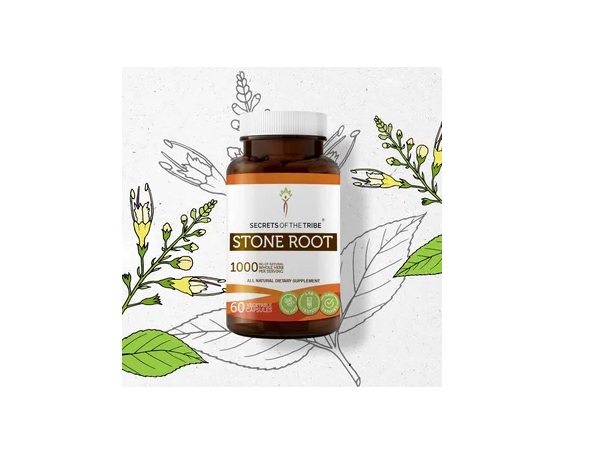Stone root, scientifically known as Collinsonia canadensis, is a perennial herbaceous plant native to North America, particularly the eastern United States and Canada. Also known as Canada horsebalm, hardhack, or richweed, stone root has a long history of use in traditional Native American and folk medicine for its medicinal properties. Stone root supplements are derived from the rhizomes and roots of the plant and are valued for their potential health benefits. In this comprehensive guide, we will explore the diverse benefits of stone root supplements, including their historical uses, active constituents, and current scientific evidence supporting their efficacy.
Understanding Stone Root
Stone root has been used for centuries by indigenous cultures and early European settlers for its medicinal properties. The rhizomes and roots of the stone root plant contain a variety of bioactive compounds, including glycosides, flavonoids, tannins, and essential oils, which contribute to its pharmacological effects. Stone root is classified as an astringent, diuretic, and tonic herb and has traditionally been used to support various aspects of health, including digestive function, urinary tract health, and circulatory system health.
Digestive Health
One of the primary benefits of stone root supplements is their ability to support digestive health and alleviate symptoms of gastrointestinal disorders. Stone root contains astringent compounds that help tone and strengthen the mucous membranes of the digestive tract, reducing inflammation and improving overall digestive function. Stone root supplements may help alleviate symptoms of conditions such as hemorrhoids, varicose veins, and rectal prolapse by promoting venous circulation and reducing swelling and discomfort. Additionally, stone root may help stimulate appetite, improve digestion, and relieve symptoms of indigestion and bloating.
Urinary Tract Health
Stone root supplements may have beneficial effects on urinary tract health and help alleviate symptoms of urinary disorders. Stone root contains diuretic compounds that help increase urine production and promote the elimination of waste products and toxins from the body. Stone root supplements may help reduce urinary tract infections (UTIs), kidney stones, and urinary retention by supporting kidney function and urinary tract health. Additionally, stone root’s astringent properties may help tone and strengthen the bladder and urinary sphincter muscles, reducing urinary incontinence and promoting bladder control.
Circulatory System Health
Stone root supplements may help support circulatory system health and promote cardiovascular function. Stone root contains flavonoids and glycosides that help improve blood circulation, reduce inflammation, and strengthen blood vessel walls. Stone root supplements may help reduce symptoms of chronic venous insufficiency, such as varicose veins, leg swelling, and leg cramps, by promoting venous tone and improving blood flow. Additionally, stone root may help reduce the risk of cardiovascular diseases such as hypertension, atherosclerosis, and heart disease by supporting vascular health and reducing oxidative stress.
Anti-inflammatory Effects
Emerging research suggests that stone root supplements may have anti-inflammatory effects that help reduce inflammation and alleviate symptoms of inflammatory conditions. Stone root contains flavonoids such as quercetin and rutin, which have been shown to inhibit inflammatory enzymes and cytokines, thereby reducing inflammation and oxidative stress. Stone root supplements may help relieve symptoms of conditions such as arthritis, gout, and inflammatory bowel disease (IBD) by reducing pain, swelling, and tissue damage. Additionally, stone root’s astringent properties may help protect against gastrointestinal inflammation and promote digestive comfort.
Menstrual Health
Stone root supplements may help support menstrual health and alleviate symptoms of menstrual disorders in women. Stone root contains astringent compounds that help regulate menstrual flow, reduce menstrual cramps, and alleviate symptoms of premenstrual syndrome (PMS). Stone root supplements may help tone and strengthen the uterine muscles, reducing heavy menstrual bleeding and promoting uterine health. Additionally, stone root’s diuretic properties may help reduce water retention and bloating associated with PMS.
Dosage and Safety Considerations
Stone root supplements are generally considered safe for most individuals when taken at recommended doses. However, it is essential to follow the dosage instructions provided by the manufacturer or healthcare professional. Stone root supplements are available in various forms, including capsules, tablets, tinctures, and teas. The dosage may vary depending on factors such as age, weight, and the intended use of the supplement. It’s essential not to exceed the recommended dosage or use stone root supplements for extended periods without consulting a healthcare professional. Pregnant and breastfeeding women should use caution and consult with their healthcare provider before using stone root supplements.
Conclusion
In conclusion, stone root supplements offer a range of potential health benefits, including digestive support, urinary tract health promotion, circulatory system support, anti-inflammatory effects, menstrual health support, and more. While scientific research on stone root’s efficacy is ongoing, its long history of traditional use and promising preliminary evidence suggest that it may serve as a valuable natural remedy for various health concerns. By incorporating stone root supplements into your wellness routine, you can explore natural approaches to support your health and well-being. However, it is essential to use stone root supplements with caution and under the guidance of a qualified healthcare professional to ensure safety and efficacy.

